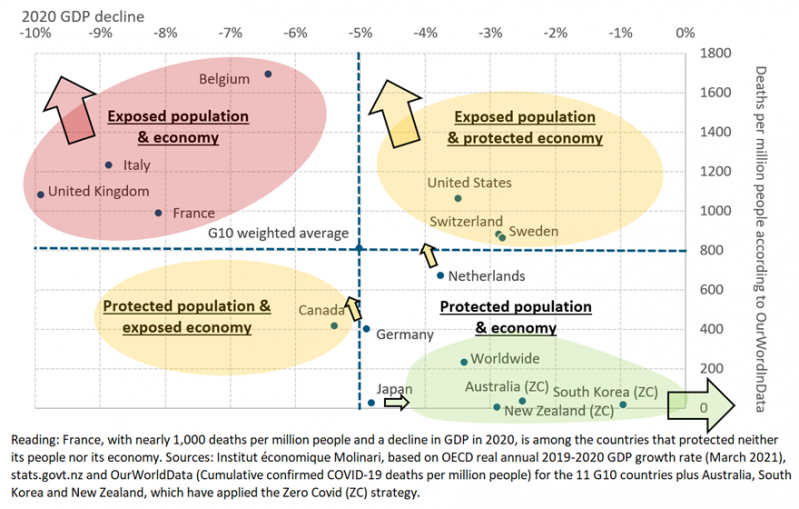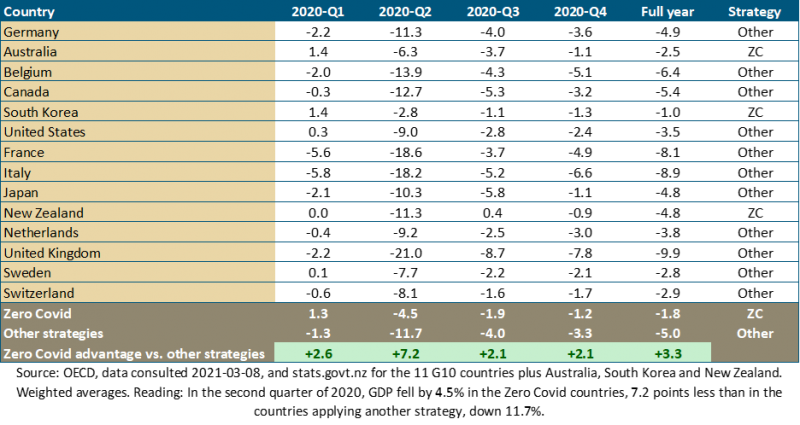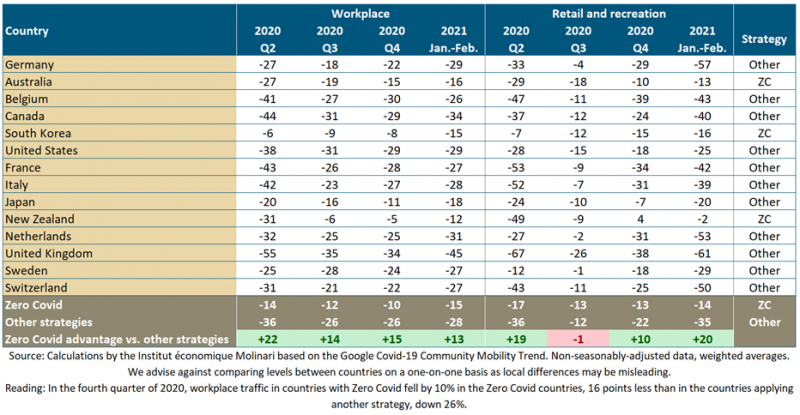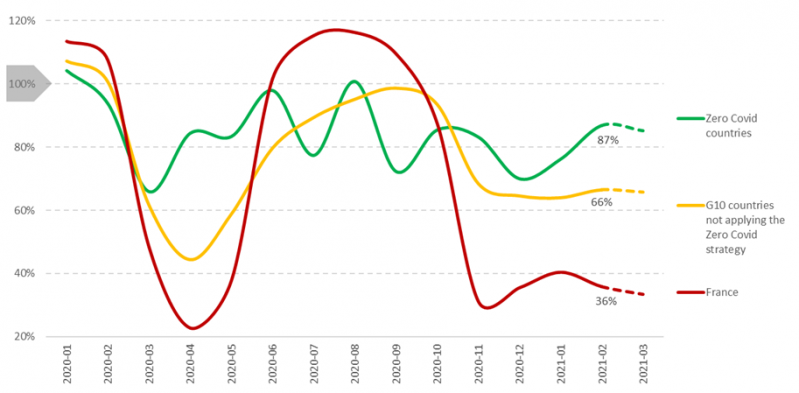La Société universitaire européenne de recherches financières (SUERF) vient de publier le brief ci-dessous dédié à l’étude de l’Institut économique Molinari sur le coût sanitaire et économique de la pandémie dans le G10 par rapport à 3 pays qui poursuivent une stratégie d’élimination. En parallèle, elle a invité Cécile Philippe à présenter cette étude dans une conférence en compagnie de Donato Masciandaro (Bocconi University), Antonio Spilimbergo (FMI), Luiz de Mello (OCDE), David Miles (Imperial College) et Ernest Gnan (OeNB).
SUERF est une association destinée à développer les échanges entre les représentants des banques centrales et des superviseurs, les représentants du secteur financier et le monde académique. Ses membres sont issus de toute l’Europe et au-delà. Ses travaux portent sur l’analyse des marchés, des institutions financières, de l’économie monétaire, de la conduite de la réglementation, de la supervision et de la politique monétaire, et des questions connexes.
SUERF Policy Brief, No 83 (April 2021), by Cécile Philippe and Nicolas Marques, respectively President and General Director of the Institut économique Molinari.
The Zero Covid strategy is by far the most effective way to fight the current pandemic as show a comparison of the G10 countries to three OECD countries that have implemented an elimination strategy (Australia and New Zealand) or something similar (South Korea).
After a Covid-19 fight lasting more than 12 months, the data show the value of the elimination strategy and contradict the idea, widespread in France and in most Western countries, that it was necessary to choose between protecting the economy and protecting public health on the grounds that these two goals were in conflict. At this stage, experience shows the elimination strategy (Zero Covid) to be more effective in both health and economic terms than the mitigation strategy applied in many countries.
Covid: The countries that performed best protected both their people and their economies in 2020

The Zero Covid strategy benefits the economy
- Short-term positive effects: Countries pursuing a Zero Covid strategy experienced a less severe economic decline in the second quarter of 2020 than the countries that allowed the virus to spread to such an extent that their health systems were saturated (-4.5% versus -11.7%).
- The Zero Covid strategy is showing lasting positive effects: In the fourth quarter of 2020, the countries applying this strategy had almost returned to normal economic activity. Their GDP was down only slightly (-1.2%) compared to 2019. Meanwhile, the decline in GDP was greater (-3.3%) in countries that had not eradicated the virus.
Change in quarterly GDP compared to the same period a year earlier (%)

Zero Covid: mobility that stands up better over time
- Mobility data from Google show that “workplace” traffic in the second quarter of 2020 fell by less in the countries applying the Zero Covid strategy (-14 % compared to -36 %). These data also show that Zero Covid countries retained a significant advantage with a 15% reduction in mobility in January-February 2021 compared to 28% in countries not applying a Zero Covid strategy.
- Google data show that traffic in “cafés, restaurants, hotels, non-food businesses and leisure and cultural activities in general” was down by 14% in January and February 2021, compared to 2020, in the countries applying the Zero Covid strategy. This is a much smaller decline than in the countries applying a mitigation strategy (down 35%).
Change in Google « workplace » and « leisure and retail » mobility indices compared to a 5-week benchmark period in early 2020 (%)

Zero Covid helps control uncertainty
Cross-referencing of quarterly economic and health data confirms the superiority of the elimination strategy in terms of anticipation. People in those countries benefit from a level of visibility enabling them to project their societies and economies into the future.
In contrast, the course taken by the G10 countries has produced fluctuations, with the epidemic rebounding in the fourth quarter of 2020 everywhere except Japan, which is moving closer to Zero Covid. The mitigation strategy is causing them to seesaw, making it difficult to project into the future and thereby penalising societies and economies. This is especially problematic for businesses that depend on significant social interaction, which have been closed for months, as representatives of the hotel, restaurant, culture and recreation sectors have stated repeatedly.
In February 2021, Google searches for the word “Restaurant” were 64% lower than in February 2019. This decline was five times greater than in the Zero Covid countries, where restaurants are open and searches are down only 13% from February 2019.
Restaurants better protected in the Zero Covid countries: the example of changes in the number of Google searches for “Restaurant” compared to the same month in 2019

Source: Calculations by the Institut économique Molinari based on Google Trends.
Participation in economic and social life is a function of people’s confidence in being able to take part without running the risk of falling ill, contaminating others or seeing health services overwhelmed.
It is not only government-imposed restrictions that reduce movement. Voluntary decisions by individuals to cut back on social life in the face of a fast-spreading virus also play a key role. The Swedish example shows the importance of this phenomenon since, even without a lockdown, the decline in mobility was significant. This explains why Sweden’s economic contraction was close to the levels observed in Scandinavian countries that went into formal lockdown. Where the elimination strategy is implemented, the end of the tunnel becomes predictable, and it is then possible to make reliable long-term plans, resulting in stronger economic performance and lower mortality.
Recommendations
- Invite an open dialog about the adoption of a Zero Covid strategy to include experts from countries that have implemented it thus far.
- Rally the diplomatic network and parliamentarians representing French citizens abroad to broaden feedback on Zero Covid strategies.
- Assign mandates to assess the advantages and disadvantages of strategies for fighting SARS-CoV2 by calling, in particular, upon French public organisations that analyse public policy (Conseil d’analyse économique, CESE, France stratégie, etc.)
- Organise feedback from French communities that have implemented the Zero Covid approach (New Caledonia, etc.).
- Support pilot projects in parts of France when local executives are receptive to the advantages of the Zero Covid strategy.
- Bring the Zero Covid strategy into analysis of risks related to the health crisis at both the French and European levels. The European Union can be a major player in the strategy’s coordination.
Reference
Philippe Cécile and Nicolas Marques (2021), “The Zero Covid strategy protects people and economies more effectively”, Institut Économique Molinari, Paris-Brussels, April.
f_d337961ae3a865e12888d8785f8032d8_23897_suerf




